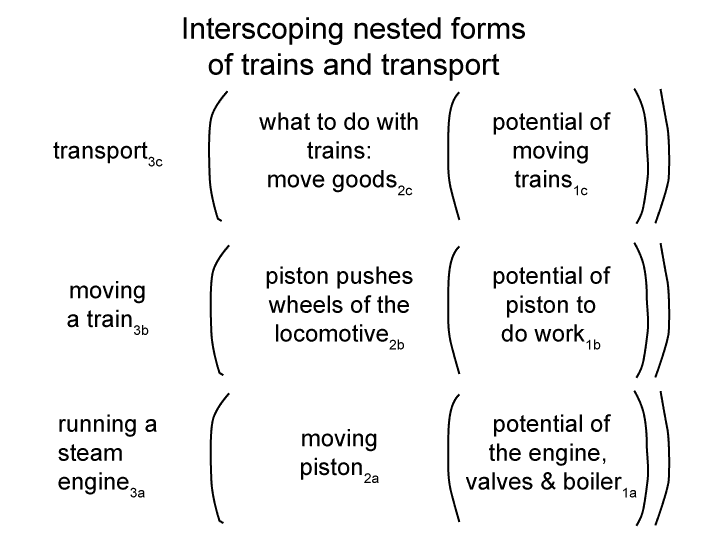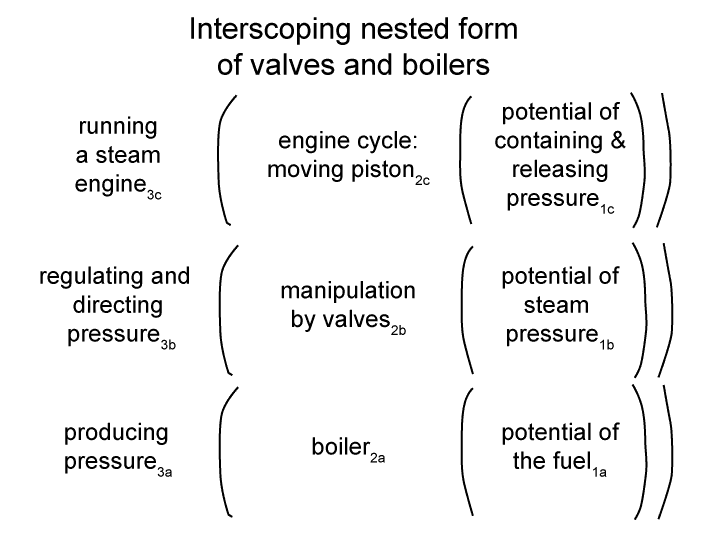Category Archives: Our current Lebenswelt is not the Lebenswelt that we evolved in
Human psychology evolved under in the social milieu of constrained complexity. Currently, humans live in unconstrained complexity. What has this done to our minds? These topics are addressed in various parts of An Archaeology of the Fall, particularly in chapters 8C and 11B.
Man and Sin by Piet Schoonenberg (1964) 2.3 F
Summary of text [comment] page 80
[The piston of the steam engine could accomplish work.
What type of work?
‘Work’ has a technical definition in physics. Here, I mean ‘getting a task accomplished’ in contrast to ‘wasting effort’.
This goes with the perspective level of a steam engine.
The perspective level of the piston may interscope with higher nested forms.
The result is another interscope.]
Man and Sin by Piet Schoonenberg (1964) 2.3 C-2
[How about this metaphor?
The person’s psyche is like a steam engine.
Perhaps, the normal contexts of think and law act like regulators. Conscience and dispositions act like fuel.
Sigmund Freud, one of the founders of psychoanalysis, started with a picture of the unconscious as a steam engine powering a locomotive.
Freud wrote between 1890 and 1950 AD (7690-7750 U0′).]
Man and Sin by Piet Schoonenberg (1964) 2.2 DY
Summary of text [comment] page 78
The limited goods (that a sinful person chooses) have a tendency to slip away. A sinful person may cling to a shred of virtue. But only for so long.
Schoonenberg wrote that fallen man is unable, without grace, to keep the commandments of the natural law for a long time.
[Why did Schoonenberg refer to ‘the commandments of the natural law’ and not ‘the divine law’?
Does Schoonenberg conflate thinkdivine and lawessential?
Or does his intuition implicitly comply with the explicit model of the intersection of virtue and sin?]
Man and Sin by Piet Schoonenberg (1964) 2.2 DX-2
[The hero stands for Progressive television producers (whose way of talk exploits the viewers, since they cannot talk back). The victim stands for the viewer (who cannot talk back to the television, therefore is a victim).
The expectation is that the victim-viewer will join the television producer-exploiter in a mutual hatred of the one designated as the anti-object. ‘The bad one’, in many these shows, stands in for those who do not watch TV and mind their own business.
Thus, in contradiction to Jesus’ words in John 15:5, the so-called Progressive mainstream American TV portrays a world where both producer and viewer love one another while both hating their fellow “man” (the stock character accused of the projector’s moral failures).]
Man and Sin by Piet Schoonenberg (1964) 2.2 DX-1
[Watch American television in 7816 U0′ in that regard.
The stock American TV show goes like this:
A hero and a victim appear to join together in order to identify and destroy the victimizing bad person.
Televisionary moral good foils a third party; a stock character who is responsible for making the victim who “he” is.]
Man and Sin by Piet Schoonenberg (1964) 2.2 CR-1
[Once a sovereign religion is established, a positive feedback loop increases sovereign power no matter what the state policies are.
The state always commands a we win-you lose advantage.]
Man and Sin by Piet Schoonenberg (1964) 2.2 CQ
[All interventions by the postreligious (enlightenment) sovereign religions are ‘we win and you lose’ for traditional religions.
Once intentions are more consequential than consequences, then consequences may be blamed on scapegoats.
When the intervention improves the actuality, it verifies the ideological slogan.
When the intervention worsens the actuality, it verifies the ideological slogan.
What slogan?
We are the good ones who must identify and destroy the bad ones.]
Man and Sin by Piet Schoonenberg (1964) 2.2 CO
Summary of text [comment] page 75
[In addition, the single actuality in an intersection may be contextualized by a content-level normal context.
When Progressives try to do good through central government intervention, they impose a context that influences this single actuality. They impose a normal context as part of their sovereign religion.
That normal context brings a potential into relation with the actuality of ‘what is good and what is bad’. For Progressives, that potential always contains ‘the possibility of enhancing sovereign power’.
How?
The so-called benefactors of Progressive sovereign power are rendered good, in concert with the slogan ‘welfare is for the good of single parent households’.]


